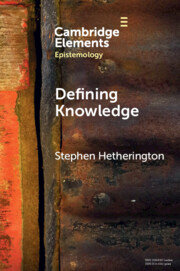Element contents
Defining Knowledge
Published online by Cambridge University Press: 19 October 2022
Summary
Keywords
- Type
- Element
- Information
- Series: Elements in EpistemologyOnline ISBN: 9781009092203Publisher: Cambridge University PressPrint publication: 10 November 2022
References
- 11
- Cited by



